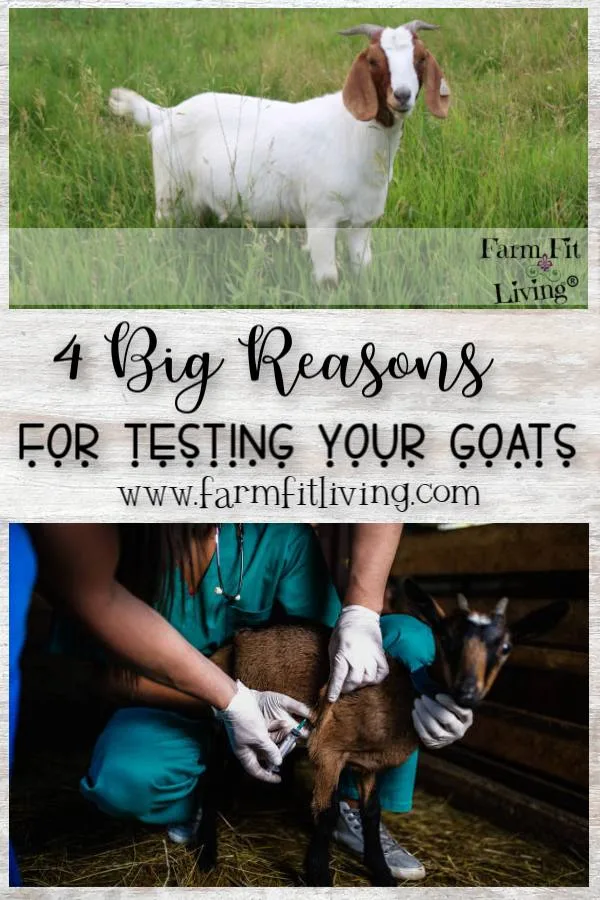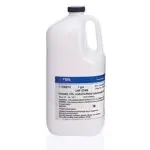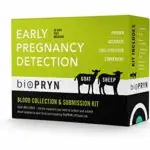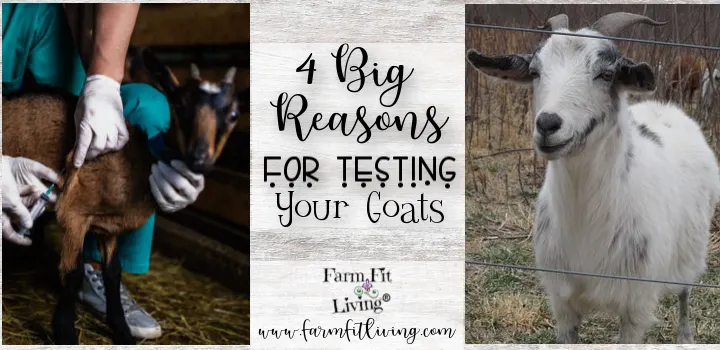Are you looking for reasons for testing your goats because others are doing it?
I recently came into a discussion on reasons for testing your goats and was very intrigued. Quite frankly, I didn’t know it was a big deal because I had never dealt with any of these in my herd!
However, they ARE becoming more and more of a big deal as producers and buyers are becoming more aware of bio-security. I’m a huge proponent of being proactive with raising animals. And I run a closed herd.
Or…do I REALLY run a closed herd?
In this post, I will:
- Explain big reasons for testing your goats,
- The methods and ways you should be testing your goats,
- How to interpret test results and what it can mean for your herd.
Disclaimer: I am not a veterinarian. However, I do have a 4 year degree in Animal Science & Industry from a University, a Master’s degree in Agricultural Education & over a decade of experience raising goats. I believe it’s my duty to share those experiences with other goat producers. I work very closely with my own veterinarian whom I trust and seek advice from on the regular. Both of us are human beings – Not Super Heros. Read more here…

Johnes Disease
According to Johnes.org, this disease is a highly contagious gastrointestinal disease caused by a bacteria spread through milk and manure. It begins in young kids and then incubates long term into adult hood. Main symptom include weight loss and diarrhea.
There are a few ways to test for Johnes:
- Fecal Testing
- Blood Testing
- Milk sampling
There is no cure or vaccines for Johnes. If you do have an animal infected, the best way to manage your herd is to cull the animal and continually test females for possible bacterium in the milk. Keep a close eye out for any animals who might be losing weight and test accordingly.
CL
The contagious disease called Caseous Lympadenitis (CL) is a bacterial infection caused through wounds caused by head butting, punctures and shearing. According to tennesseemeatgoats.com, the main symptom is an encapsulated abscess in which there is no cure.
At this time, there are two main ways to handle an abscess:
- Lance and drain the puss (be sure the goat is confined away from the herd so the herd is not infected). You can send this puss into a lab to be tested.
- Or use Formalin 10% (not labeled for goats) to embalm the abscess. It will then dry up and fall off.

It’s so easy to say that since you have a closed herd, none of your goats will have CL. Goat’s get abscesses and they aren’t always CL abscesses. And, even if you don’t let new goats into your herd, there are other ways your goats can get CL abscesses.
Other wildlife, such as deer as well as flies can carry the CL bacteria and spread it into your goats.
Luckily, there is a vaccine for CL that is very safe to use. You can get it from your vet or favorite vet supply company.
CAE
Caprine Arthritic Encephalitis (CAE) is a viral infection in goats that causes chronic joint issues in adult goats. Here are a few other signs of CAE:
- Smooth knee pads.
- Hard udders with no milk
- Seizures in goat kids
- Pneumonia
The infection is spread through body fluids and milk/colostrum. Many producers will test their does before kidding to make sure their milk is CAE free it won’t be spread to the kids.
Because that is what this CAE blood test focuses on: Antibodies. It’s tricky because some goats haven’t produced antibodies yet, so the result will be a false negative. Therefore, it’s hard to really know how accurate these test results really are.
Pregnancy
While definitely not a disease, pregnancy certain goats could be unwanted or maybe you need to know right away.
We like to pregnancy test our does that we have artificially inseminated for confirmation of pregnancy. The test we have been using is a blood test that is sent into a testing lab.
When can you blood test a goat for pregnancy? After 30 days, the doe is able to be tested. It’s just good to have a peace of mind so that you can make decisions in your operation.

Other Possible Diseases to Test For?
Depending on where you live, there could be a few more diseases to test for. One of those is Brucellosis. Some states and countries are not Brucellosis free, so that is something to look into.
I strongly recommend finding a local veterinarian or other goat producers in your area. Follow along with what they are doing to raise healthy goats.
Reasons for Testing Your Goats?
Many people say they test so that they can have a “closed herd.” What exactly is a closed herd?
In my own words, a closed herd is: A herd that is away from other herds where no other animals enter in or out. But, the more I learn, the more I wonder if there’s any such thing as a closed herd.
No matter how closed your herd is, they will still have access to disease-carrying wildlife. This is every reason to continue to test your herd if it openly browses outside. No matter how great your fences are, other wildlife will still enter into your goat paddocks.
A good rule of thumb is to test a percentage of the herd (20% or more) on a yearly rotation. It’s an easy way to be proactive and stay on top of diseases.
The other reason to test your herd is to make your customers happy if you are selling goats. Some buyers insist on seeing test results for the diseases listed above. If you want them to buy your goats, you’ll need to test and then apply the cost into the cost of the goats.
You’ll need to keep a very good record of the goats you get tested for this reason.
Your potential customers will ask to see them. They will expect every goat on your farm to be on the papers. Even if you spot test, you’ll need to have every goat on this record and its plan or results of testing.
Finally, the biggest reason for testing your goats is that it is the producer’s ethical responsibility to do what he/she can to control diseases and prevent diseases from entering someone else’s herd. The thing is: An animal can be negative for years and then become positive infecting the rest of the herd.
Wait a minute…If you think I’m taking sides….I’m totally not. I’m not going to discuss reasons for not testing.
Reasons for NOT TESTING?
Some producers will argue that it’s better to just not mess with the testing of these diseases. And there are some very specific reasons why. Let’s discuss the other side of this equation.
The biggest argument is that the only reliable test for CL and Johnes are done when there are already symptoms. Meaning…It’s really already too late. The goats have it and you have paid for the test even though the symptoms are there. Yes, it can be a clarification of the diseases, but the tests have been shown to be not very reliable. It’s also more expense to be testing for something you can’t already see.
So, your animal is already sick and dying when you finally get a result back yay or nay. Peace of mind?
Finally, if you buy from someone who says they have a “clean herd” that has been tested, and if you know better, you’ll know that these tests won’t really mean much until the animal gets sick.
Everyone also needs to remember that not everyone has 5 goats. Nobody is testing every single animal when they have that many. It costs too much. If there’s no issues with the end products, there’s no reason to test/cull.
What do you do now? I hope I’ve given you enough to make a decision. There is one more thing to note and that is cost.

Where to Find Goat Testing Kits
There’s a couple of ways to test your goats for various diseases or pregnancy. You can work with your veterinarian or with a couple of labs I will list here:
- Washington Animal Disease Diagnostic Laboratory (WADDL)
- Pan American Veterinary Laboratories in Austin, Texas
- Your State’s Veterinary Laboratory
These are just a few. As far as cost goes, it varies even more!
How much money on average does it take for testing your goats ?
The cost of testing varies greatly from lab to lab. The lab my vet sends our pregnancy blood tests is around $10.
For the diseases, lots of labs have packages that range $15 to $40. It just best to check with your state first and then shop around to other labs to find the best cost for you. It all comes down to the decision that is right for you.
Use Your Best Judgement for Testing Your Goats
Ultimately, it’s your decision whether or not you make the final decision about testing your goats. I’ve given you pros and cons for testing that you can consider and factor in your own values and resources.
And now, it’s up to you. Best of luck!



